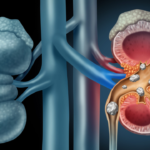
A diagnosis of bladder cancer can be a profoundly life-altering, upsetting, and traumatic experience. It can be difficult to deal with the diagnosis and manage the symptoms, but there are resources and assistance available to assist. We’ll go over various coping mechanisms and resources for living with urinary cancer in this blog.
Coping Techniques
Being told that you have urinary cancer can be frightening and upsetting. You may, however, take action to control your illness and deal with the diagnosis. We’ll talk about several coping mechanisms and resources in this post that can make living with urinary cancer more bearable.
Learn for Yourself: Information Is Power
Being informed of the condition is one of the most crucial things you can do if you have urinary cancer. By doing so, you’ll be better able to decide on your course of therapy and experience a greater sense of control over your circumstances. Spend some time learning about the signs, different forms of urinary cancer, and potential therapies. To obtain knowledge, consult your doctor, study books, and look up reliable web sources. You can better anticipate what to expect and make decisions regarding your care if you are educated.
Self-care is crucial, so take care of yourself.
It can be physically and emotionally taxing to have bladder cancer. To properly manage your disease, self-care must be given priority. Your general health may be enhanced by eating a balanced diet, getting adequate rest, and exercising frequently. These lifestyle modifications can also lessen the negative effects of therapy and help you have a better quality of life while managing your cancer symptoms.
Speak with your physician; your healthcare team is here to help.
When dealing with bladder cancer, your healthcare team is a crucial support system. They can provide you with advice and assistance to help you take care of your condition. It’s critical to be upfront with your doctor, to express your worries and emotions, and to ask questions. Your medical team can support you in navigating your treatment choices, controlling your symptoms, and adjusting to your diagnosis.
Seek Assistance—You Don’t Have to Face This Alone
Having a support network is crucial since coping with bladder cancer can be difficult. In addition to the emotional support that friends and family may give, support groups and online communities can also provide extra resources and a feeling of community. These groups might provide you the chance to get in touch with people who are going through comparable things, to express your thoughts, and to get emotional support.
Counselling and therapy might be helpful in addition to support groups for overcoming the emotional difficulties associated with bladder cancer. You can handle anxiety, sadness, and other emotional difficulties that could appear during your trip by speaking to a qualified expert.
Support Options:
Support Groups: Support groups offer people with urinary cancer a secure and encouraging atmosphere in which to express their thoughts and feelings. These groups may provide a sense of belonging, emotional support, and useful knowledge.
Online Communities: People with urinary cancer can connect with others going through comparable situations in a variety of online forums and communities. People may share their experiences, ask questions, and get assistance in these groups.
Therapy and counselling: Urinary cancer can have a negative impact on a person’s mental health. Counseling and counseling can support people in coping with the emotional effects of their diagnosis and provide them with the tools they need to handle the difficulties of having bladder cancer.
Advanced urinary cancer patients may benefit from hospice and palliative care, which may offer comfort and support to both the patient and their loved ones. These treatments can boost the quality of life and aid in symptom management while also offering emotional support.
Conclusion:
Dr. Rajesh Dhake is an experienced urologist who specializes in the treatment of urinary cancer. He provides compassionate and comprehensive care to his patients, taking into consideration their individual needs and circumstances. He understands the emotional toll that a urinary cancer diagnosis can take on individuals and their families and provides support and guidance throughout the treatment process.
In conclusion, living with urinary cancer can be challenging, but with the right strategies and support, individuals can manage their symptoms and improve their quality of life. It is important to educate yourself, take care of yourself, communicate with your healthcare team, and seek support from friends, family, and support groups. Additionally, seeking the care of an experienced urologist like Dr. Rajesh Dhake can provide peace of mind and ensure the best possible outcome.




